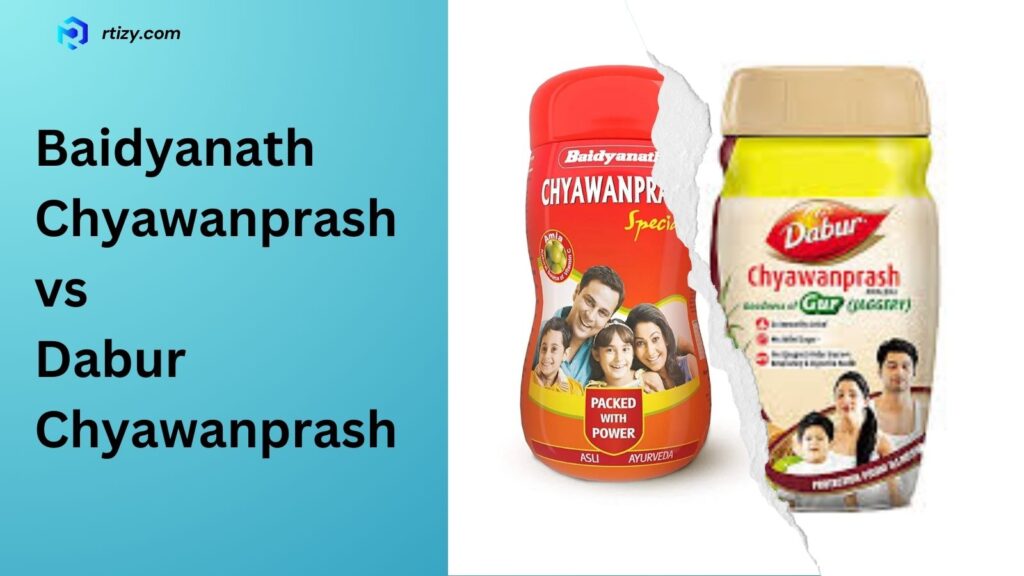Chyawanprash is a traditional Ayurvedic herbal jam that has been used for ages to improve energy, strengthen immunity, and advance general well-being. It is traditionally eaten in the winter to ward against colds and the flu. It is a rich source of antioxidants, vitamins, and minerals. Dabur and Baidyanath are two well-known names in the field of Ayurvedic supplements. Both businesses have made a name for themselves in the industry, largely because of Chyawanprash, their primary product.
Though there are some significant distinctions between the two goods, both brands have a lengthy history and a solid reputation for high quality. Let’s compare and see which is superior.

Baidyanath Chyawanprash vs Dabur Chyawanprash
Baidyanath: Legacy in a Jar
Baidyanath, with its rich 160-year history, is synonymous with trust in Ayurveda. Their Chyawanprash boasts:
- Time-tested recipe: Passed down through generations, it follows traditional methods.
- Natural ingredients: Amla (Indian gooseberry), ghee, and a variety of herbs form the base.
- Manufacturing with care: Stringent quality control ensures purity and potency.
- Reputation for a reason: Baidyanath enjoys a loyal customer base who value its authenticity.
Dabur: A Household Name
Dabur, another major player in Ayurveda, offers a widely recognized Chyawanprash:
- Ayurvedic heritage: Dabur has been a pioneer in Ayurvedic products for over 130 years.
- Unique formulation: Their Chyawanprash might contain additional ingredients like honey or ghee.
- Modern manufacturing: Dabur utilizes advanced techniques to ensure product consistency.
- Market leader: Dabur’s Chyawanprash is easily available, making it a popular choice.
Picking Your Perfect Chyawanprash
Now, let’s dissect the key differences to help you choose the Chyawanprash that best suits your taste and needs:
- Ingredients
Both Baidyanath and Dabur Chyawanprash share a core base of ingredients like amla (Indian gooseberry), ghee (clarified butter), honey, and a variety of herbs known for their medicinal properties in Ayurveda. However, the specific selection and ratio of these herbs might differ slightly between the two brands. Baidyanath’s Chyawanprash might contain a higher concentration of certain herbs like pippali (long pepper) and vacha (calamus root), which are known for their bitter and pungent taste. This can contribute to a more traditional Ayurvedic taste profile.
On the other hand, Dabur Chyawanprash might focus on a more balanced taste profile that appeals to a wider audience. Their recipe might include a higher proportion of sweeter ingredients like honey or dates, alongside herbs known for their warming and slightly sweet properties, such as elaichi (cardamom) and dalchini (cinnamon). This can result in a more palatable taste for those who find the traditional Ayurvedic profile too intense.
- Taste and Texture
Due to the potential difference in herb selection, reviews suggest Baidyanath Chyawanprash has a slightly less sweet and more tart or bitter taste compared to Dabur’s Chyawanprash. Additionally, the texture might vary slightly. Baidyanath’s Chyawanprash might be a bit thicker and more granular due to the presence of certain herbs, while Dabur’s Chyawanprash might have a smoother consistency.
- Nutritional Value and Health Benefits
Both Baidyanath and Dabur Chyawanprash offer a similar range of health benefits due to their shared core ingredients. They are both rich in antioxidants, vitamins, and minerals, which can contribute to strengthening immunity, enhancing energy levels, and promoting overall well-being. However, some minor variations might exist based on the specific blend of herbs used in each brand’s recipe. For instance, if Baidyanath’s Chyawanprash contains a higher amount of ashwagandha, it might be particularly beneficial for those seeking stress relief and improved sleep quality.
- Packaging
Dabur Chyawanprash might come in a wider variety of packaging options, catering to different needs and preferences. They might offer options in various sizes, from single-serving packets to larger jars for families. Additionally, Dabur might utilize more modern packaging materials for better shelf life and aesthetics. Baidyanath, on the other hand, might focus on a more classic approach with glass jars or containers made from recycled materials.
- Price
Both Baidyanath and Dabur Chyawanprash are generally priced competitively. The price can vary depending on the size and packaging of the product. It’s always a good idea to compare prices between different retailers before making a purchase.
Quick Comparison: Baidyanath Chyawanprash vs Dabur Chyawanprash
| Feature | Baidyanath Chyawanprash | Dabur Chyawanprash |
| Ingredients | Focus on potentially bitter/pungent herbs like pippali (long pepper) and vacha (calamus root) | Focus on sweeter ingredients like honey/dates and warming herbs like elaichi (cardamom) and dalchini (cinnamon) |
| Taste & Texture | Less sweet, might be a bit tart/bitter, thick & grainy | Sweeter, smoother texture |
| Health Benefits | Both provide similar benefits like boosting immunity and energy, but with slight variations based on their specific blend of herbs | Both provide similar health benefits, boosting immunity and energy, with slight differences based on their specific blend of herbs |
| Packaging | Comes in classic glass jars, often using recycled materials | Available in various sizes and packaging materials, more modern in style |
| Price | Competitive pricing | Competitive pricing |
Conclusion
There is no obvious winner in the comparison between Baidyanath Chyawanprash and Dabur Chyawanprash because each brand has its own advantages and products. Baidyanath promotes traditional knowledge and purity, whereas Dabur is the best when it comes to modernity and accessibility. The decision between the two ultimately comes down to personal tastes, depending on whether one values price and ease of use more than legacy and authenticity.